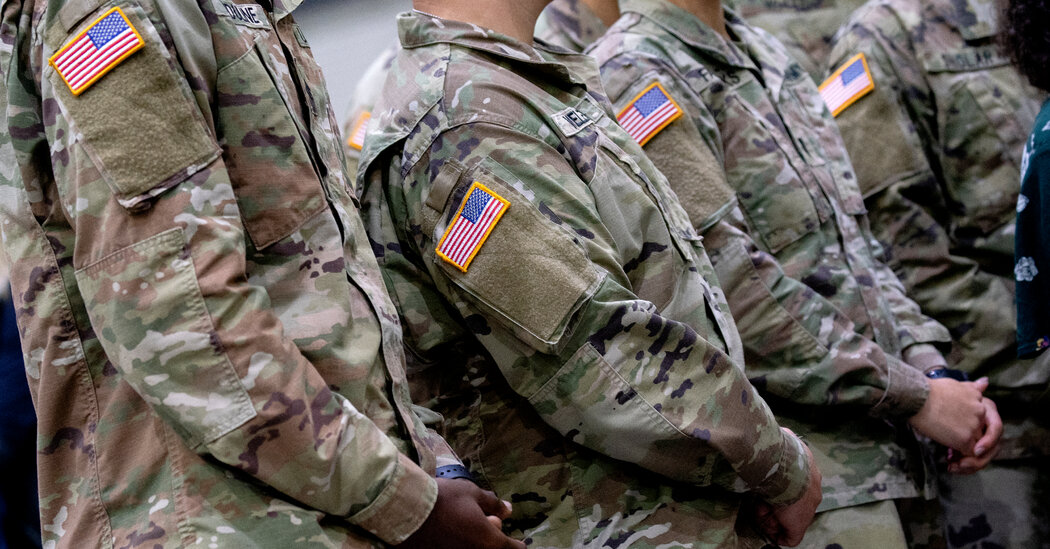
WASHINGTON — Defense Secretary Lloyd J. Austin III has put 8,500 American troops on “high alert” for possible deployment to Eastern Europe, as NATO and the United States braced for a possible Russian invasion of Ukraine, the Pentagon announced on Monday.
Most of the 8,500 troops would take part in a NATO response force that might soon be activated, said John F. Kirby, the Pentagon spokesman. The remaining personnel would be part of a specific U.S. response to the deepening crisis, Defense Department officials said, most likely to provide assurance to American allies in Eastern Europe who are fearful that Russia’s plans for Ukraine could extend to the Baltics and other countries in NATO’s so-called eastern flank.
“It’s very clear the Russians have no intention right now of de-escalating,” Mr. Kirby said at a news conference on Monday. “What this is about, though, is reassurance to our NATO allies.”
Mr. Kirby’s announcement comes after The New York Times reported on Sunday that President Biden was considering the deployment of several thousand U.S. troops, as well as warships and aircraft, to NATO allies in the Baltics and Eastern Europe.
The moves signal a major pivot for the Biden administration, which until recently was taking a restrained stance on Ukraine, out of fear of provoking Russia. But as President Vladimir V. Putin of Russia has ramped up his threatening actions toward Ukraine, and talks between American and Russian officials have failed to discourage him, the Biden administration is moving away from its previous strategy.
At the same time, the administration continues to insist that the United States has no intention of going to war with Russia over the issue. Since Ukraine is not in NATO, the alliance is not bound by its treaty to come to Ukraine’s defense. Russia’s massing of more than 100,000 troops on Ukraine’s border, and NATO’s response, has nonetheless raised the specter of a war that could escalate and widen.
“I don’t think anybody wants to see another war on the European continent,” Mr. Kirby said.
In a meeting on Saturday at Camp David, the presidential retreat in Maryland, senior Pentagon officials presented Mr. Biden with several options that would lead to a shift in U.S. military assets much closer to Russia’s doorstep, administration officials said.
The bulk of the troops being put on higher alert are active-duty ground troops, including combat brigades, medical, aviation, transportation, intelligence and surveillance forces with their equipment, Mr. Kirby told reporters. He declined to identify the specific units, saying that families were being notified on Monday.
“High alert” means the troops are now on what Defense Department officials characterized as a tighter leash, in case deployment orders come quickly. In some cases, officials said, units that have been prepared to deploy within 10 days must now be prepared to deploy within five days.
While the United States could send some of these troops directly to Eastern European members of NATO, such as Poland or Romania, that request certain kinds of supporting forces, Mr. Kirby said most of the troops put on higher alert, if activated, would go toward a special NATO unit.
Understand the Escalating Tensions Over Ukraine
That unit, the NATO Response Force, or N.R.F., is a 40,000-member multinational force made up of land, air, maritime and Special Operations Forces troops that is intended to respond quickly to emergencies.
“This is significant because it signals that the U.S. is not just doing this unilaterally but is preparing to provide its forces to the N.R.F., all within a NATO context,” said Frederick B. Hodges, the former top U.S. Army commander in Europe now with the Center for European Policy Analysis.
In 2014, after Russia seized Crimea and parts of eastern Ukraine, the alliance designated about half of this unit, or about 20,000 troops, to be on “very high readiness” for the most urgent missions.
The NATO Response Force reports to Gen. Tod D. Wolters, a four-star U.S. Air Force officer who is the alliance’s top military commander.




